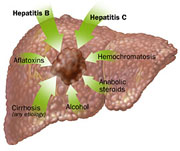Liver Cancer (Hepatocellular Carcinoma)

Hepatocellular carcinoma (HCC), or liver cancer, occurs when a tumor grows on the liver. It is responsible for over 12,000 deaths per year in the United States, making it one of the most serious cancers in adults.
Liver Cancer Symptoms
Liver cancer is frequently detected during a screening for an underlying disease. Patients often complain of symptoms related to a liver disease, and upon investigation, the cancer is discovered.
If you experience any of these symptoms for more than two weeks, make an appointment with a gastroenterologist:
-
Abdominal discomfort or distention (enlargement)
-
Weight loss
-
Jaundice (yellowing of the skin and whites of the eyes)
-
Gastrointestinal hemorrhage (bleeding)
-
Nausea or vomiting
-
Persistent itching
-
Fever
Liver Cancer: Answers to Commonly Asked Questions

Did you know that liver cancer is becoming one of the fastest growing cancers in the United States? Dr. Richard Burkhart answers commonly asked questions about the disease.
Minimally Invasive Surgery Options for Liver Cancer | Q&A with Dr. Jin He
Johns Hopkins surgical oncologist Jin He discusses when surgery is an appropriate treatment for liver cancer, the minimally invasive surgical options offered, who is an ideal candidate for minimally invasive liver surgery and the importance of being treated at a comprehensive cancer program.
Liver Cancer Diagnosis
A diagnosis of liver cancer begins with a comprehensive physical exam during which you describe your symptoms and medical history. Other diagnostic procedures include:
-
Alpha-Fetoprotein (AFP) Testing
-
Imaging Tests
-
Liver Biopsy
Alpha-Fetoprotein Testing
Alpha-fetoprotein (AFP) is a protein produced by the liver in a fetus. The level of AFP in the blood drops to almost zero by one year of age.
AFP is a tumor marker because it is produced by liver tumors. A high AFP level may indicate liver cancer. In general, a steadily rising AFP level is indicative of liver cancer. If you are a high-risk cirrhotic patient (you have hepatitis C, hepatitis B or hemochromatosis), your doctor may want to check your AFP level every three to four months.
Your doctor may test for other tumor markers as well. Certain markers, especially when used in combination, have improved sensitivity and specificity for diagnosing HCC.
Imaging Tests
Imaging tests can identify tumors on your liver. Using various imaging technologies will create a detailed image of the abnormal area:
-
Ultrasound uses sound waves to create a detailed picture of your liver.
-
Computed tomography (CT) is a powerful X-ray.
-
Magnetic resonance imaging (MRI) uses magnetic waves.
-
Angiography is used to see the inside of your blood vessels and organs.
Liver Biopsy
A liver biopsy offers a definitive diagnosis but may not be necessary. If your AFP level is significantly elevated and your doctor sees a tumor on an imaging scan, then a diagnosis can be made without a biopsy.
If the results from other procedures are unclear, your doctor may order a biopsy. During a biopsy, liver tissue is removed and is sent to a pathology lab to determine whether the tissue is cancerous.
Your medical team will also want to stage the tumor, which determines the severity of the cancer. Because liver cancer is often associated with advanced cirrhosis, your doctor will determine how advanced the cirrhosis is before recommending a treatment plan.






